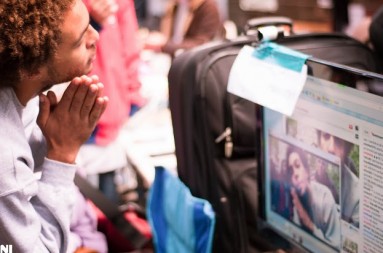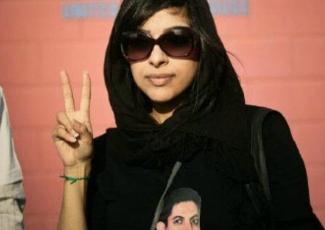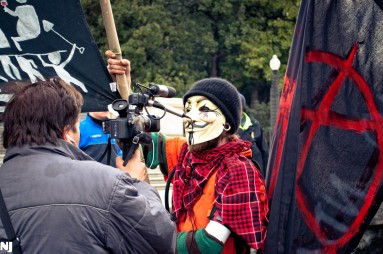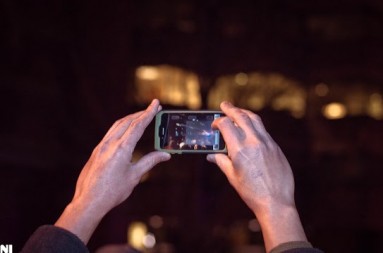An edited gchat about the perils and possibilities for activists seeking attention for movements through social media
Social movements have a complicated relationship with attention. Without attention, the movement may wither, but the wrong kinds of attention can be poisonous. The pathways towards attention have become more complicated with the advent of social media. In her recent article, “Not This One”: Social Movements, the Attention Economy, and Microcelebrity Networked Activism,” sociologist Zeynep Tufekci looks back to Todd Gitlin’s 1980 analysis of how mass-media-anointed activist celebrities often compromised their politics as well as the movement and considers thinking about how we might update it for today’s media environment.
For Gitlin, “attention” and “mass media” meant almost the same thing since the big news-gatekeepers had a near monopoly on the sort of attention a movement needed to go viral. Gitlin, a 1960s president of Students for a Democratic Society, wrote The Whole World Is Watching (1980), about how mass media distort social movements by presenting outlandish activists as movement leaders, elevating them to extremist celebrities while reinforcing how “balanced” the media outlet is in comparison. The book’s title references what protesters chanted at television cameras in ’68; it can still be heard in the 21st century, though now it's often directed at cell-phone cameras.
How do activist attention and celebrity work on social media? Have we moved from the celebrity activist to the “networked microcelebrity activist,” who is more beholden to the movement than the mass media?
The title, “Not This One”, makes reference to what Bahraini activist Zainab Al-Khawaja overheard officers saying while she was being detained. “Not this one, don’t beat this one” — her renown had made her untouchable. Nonetheless, as sociologist and New Inquiry contributing editor Nathan Jurgenson and New Inquiry editor Rob Horning discuss Tufekci's article, Al-Khawaja remains in jail.
PAYING ATTENTION
rob: I'll start by saying I have some problems with using the framework of an "attention economy" and a sort of one-dimensional definition of attention as positive
Which leads to using terms like "celebrity," which give the game away from the get-go
nathan: how do you see it as too one-dimensional?
rob: "attention economy" imports this notion of attention as currency, as fungible and abstract rather than deeply contextual
nathan: let’s think about why we might like to see attention as a resource
the main goal is looking at how attention is spent
rob: Attention seems like the product of media; it organizes it and creates it through a critical mass of focus
Yet it is talked of as an individual resource
Individual attention is pretty worthless, in activist contexts especially
nathan: i think the paper makes a great case for the value of personal attention
rob: attention is often polyvalent in a way currency isn't; increased attention to activist movements can undermine their cause or change their course as easy as help it
nathan: agree
rob: And I think the focus on attention makes it seem as if all you have to is pay attention to something to become a part of it
That sort of economic framework frames something collective (activism) as a matter of microdecisions of individuals, which I know some people insist on, but seems to me to import the sort of individualism many activist movements are explicitly trying to change
nathan: i'm in full agreement with the polyvalence of attention but am still stuck on the point that the attention one can garner is not evenly distributed and can be spent
perhaps the "out" here is redefining the attention economy as built around a polyvalent currency rather than saying attention isn't a currency
we could also look at how groups like Occupy participate in an attention economy.
rob: This strays from the paper’s parameters a bit, but the point of engaging in activism can be to escape the constraints of "attention," and its scarcity, into a practice that infuses one's life with purpose
so you don't “spend” attention from some neutral, disengaged space; you live engagement
nathan: right, a movement without attention isn't what is being analyzed here. it won’t have large impact if it doesn’t get attention
rob: but the impact it must have is to get people engaged with it at the level of living the life it posits as an alternative to what exists
attention-economy framework is possibly a barrier to that
nathan: attention is the means to get at political ends — here, mostly, taking down a repressive regime in Bahrain
ATTENTION ECOLOGY
nathan: one of the main ways that an econometric perspective — rather than ecological one — falls short is the idea of attention as poison. with money, more almost always equals better. though, as you rightly point out, attention is more polyvalent.
one argument i made in Speaking in Memes was that attention is something that can exhaust itself. as you pile money up, it doesn’t implode on itself the way attention does, as is exemplified perfectly on Portlandia with the word "OVER!"
the very popularity of something (i.e., as excess of attention) can preclude further attention
rob: yes, the "Hype cycle" comes into play
nathan: live by the meme, die by the meme. ecologic thinking would say that there may be an environmental limit.
i think the hype cycle for memes shows that sometimes short-term attention doesn’t just run out but rather that short-term attention comes at the expense of more enduring long-term attention. Occupy's virality might have actually precluded its longevity
rob: Occupy became a buzz band
nathan: getting a great Pitchfork review can actually hurt the band's longevity
rob: what is to blame? could it have been prevented?
nathan: it would mean having some mechanism that can resist attention. but the social media activism i've seen, and Tufekci describes, seems to have no such lever
rob: Do activists need to get something done before the hype cycle invalidates them?
We must overthrow Mubarak before MTV gets here
nathan: hahaha
you are one step ahead of me. that logic could only happen once we accepted that more attention is not always better
rob: good point, and that seems hard to accept in the cauldron of the movement
nathan: i wonder if even that is possible, especially given the econometric framing that sees attention as like currency
rob: there was an upside to secretive vanguardism maybe
Or you have the vanguard puppet-mastering the attention seekers while not admitting them to the "real" movement
nathan: though, there are also many positives to microcelebrity activism. attention isn’t inherently good or bad with respect to a movement
Gitlin's description is a good example of bad attention
he described the mass media choosing people who see attention as an end and the movement as a means, whereas Tufekci points to the social media environment tending to choose the reverse: attention as a means toward the ends of activism
rob: I don't know if that holds up in U.S. context
MICROCELEBRITY ACTIVISTS VS. ACTIVIST MICROCELEBRITIES
nathan: let's look at something the paper starts to do: distinguishing between those using activism to get attention from those using attention to further their activism
rob: if they can distinguish themselves
nathan: the former is a microcelebrity, according to boyd and Marwick, while the latter is a "networked microcelebrity activist" according to Tufekci. the means and ends are swapped
rob: of course they are always blurred, though
nathan: of course
but as “ideal types” — conceptual categories useful to think with — i think this distinction helps clarify things
rob: I think the more one is conscious of oneself as "celebrity" or "attention seeker," the more those ends and means get blurred.
nathan: agree, though there is less blurring in more repressive regimes. Zainab is an activist first, that is clear. in the U.S., microcelebrity and activist do blur more. in fact, Tufekci has another paper that makes a similar argument
that Occupiers maybe got too into identity politics of "being the change" they wanted to see and thus were structurally ineffectual
rob: I think "attention" frame imposes "cultural capital grab" interpretation where it is rarely self-conscious in the actors involved
nathan: but neither was cultural capital for Bourdieu. though i do think social-media metrics makes all of this pretty consciously explicit
rob: true
nathan: especially when you think the existence of your cause is at stake. when retweets and likes evidence a movement's success
rob: yes, then social media and not sociology imposes the attention-economy frame on people — an argument I am fond of!
nathan: well, i wouldn’t make such a dualist framing
rob: the movement-building tools carry poison; very "pharmacological" à la Bernard Stiegler
nathan: right
RADICAL CHIC
nathan: contrasted with Gitlin's analysis, Tufekci argues the important differences with social media are (1) attention can be generated without, or at least with less, mass media interest; (2) it is now more possible for a movement to avoid being split, or “unmade”, by celebrity; and, as such, (3) a movement can more easily deflect efforts to make the movement out to be more extreme than it is by showing the reality on the ground (in real time).
rob: she writes that social-media users have to answer to the movement, and this orients their behavior toward the right goals
but doesn’t the fame disembed individuals from movement, just as social media disembeds from community
nathan: right, Zainab struggled with that when others, but not her, were beaten
rob: social media seems more likely to accelerate the unwinding of community, hierarchizing the members of the community as individuals, not as a collective
nathan: when did this non-hierarchical community ever exist?
question is whether social media lessens that trend or not
rob: at some point there must be a shift from "we are an alternative to the mainstream” to "we are too big not to have the mainstream accept our mission"
nathan: right, that's an important inflection point
rob: how do you make that shift without becoming vulnerability to the depredations Gitlin noted?
nathan: the celebrities chosen are different
rob: but they can change, become less beholden to the movement
nathan: right, but that worry is lessened is the point. the celebrity issue is still there, but less so, hence the "micro"
rob: part of the problem with "microcelebrity" as a term is that it implies a quantity at stake, when I think Marwick/boyd are right that it is more of a practice. doesn't seem to be the way Tufekci talks about it though
nathan: we've outlined some limits of the econometric perspective but we shouldn’t reject the ways attention is a quantity. those who don’t have it know this well
it's pretty easy to be educated, well connected white dudes and argue about the negatives of attention since we don't know much about not being listened to
rob: is there is a way to do activist work without having to measure its effectiveness in fake-metric of attention?
nathan: i don’t see, say, number of twitter followers, the metric used over and over in Tufekci's paper, as "fake"
rob: it's not translatable into social good
nathan: it's quite real in its consequences
people seem to know, at the individual level, that more attention is not always better.
but at an organization level, at the movement level, there does seem to be the idea that more attention is better. get as viral as you can, make your virality viral
rob: but then that becomes an alibi for members elevated in social media to start with personal fame-seeking. "I did it for the movement"
attention as pharmacologic is really the key point
ORGANIC ATTENTION
nathan: i think we've mentioned some ways that attention is dangerous. of course, the big point in this paper is the danger of not having attention
Tufekci's argument, i think, is that social media means movements can grow more with less dilution
rob: What makes the public tune in? What about the activist's discourse stops that broader public being a consumer of media and makes them instead an engaged agent?
Guess I'm getting back to the problem of "I paid attention, I gave at the office" mentality. Paying attention is not enough, and acting as though that costs something reinforces the problem
nathan: of course. an old issue. i think the movement would encourage active participation, but passive spreading of info would be a consolation prize. something as small as changing a profile photo to the HRC logo can send a powerful message in aggregate
but if the barrier of participation is very low, then we might get seduced by all the people participating. but if the numbers are inflated and the motivation is weak, it'll be "so over" soon
rob: the question of what stops the next regime from being repressive may have roots in the activists’ tactics
If their tactics recapitulate some of the assumptions about "publics" you end up with the same political techniques in power despite the different faces in power
nathan: what specific tactic here reproduces repressive politics?
rob: The idea of using media to manipulate attention to instantiate power
may be less a tactic than a structural fact of life though
nathan: right
i am comfortable with subversive politics, to use the masters’ tools to dismantle the masters’ house
rob: I am less comfortable with that; more like the individual's motives in the end don't matter if they experience a collective subjectivity that overrides individual subject
Individual psychology and how one lives in ideology as an individual may not even be relevant to the social-movement questions in the end
nathan: let's think through an example:
i've heard debate over whether it was police or Occupiers who lead the march onto the Brooklyn Bridge roadway, leading to mass arrests but also to the first major mass media coverage of the event. in the hypothetical scenario that some Occupiers actually orchestrated the mass arrests (and then blamed the police) to get attention, what would we make of that in this specific framing here?
rob: Was getting attention ultimately even useful to the movement at that stage?
"the Occupy bubble"
I will import a very dubious metaphysical notion and ask whether this sort of "inorganic" attention is the poisonous kind vs. an "organic" attention that stems from nonmedia tactics (if anything is "nonmedia" these days)
nathan: but why is a Bahrainian protester trying to avenge her husband's beating on twitter "inorganic"?
SHITTY UTOPIA
nathan: i think Tufekci's paper is about microcelebrity activists, but you seem to want to, wonderfully cynically, talk about activist microcelebrity
rob: those activists are vulnerable to being caught up in the same practices of celebritization that macrocelebrities
nathan: when the Occupier is in my mind, i can really see your point. when the "arab spring" is in my mind, Tufekci's is more clear
rob: yes, I think this is about different forms of political control in the West and elsewhere
nathan: in this chat, we’ve conceptually split these forms apart: the microcelebrity activist vs. the activist microcelebrity. that means we can now ask: in exactly what conditions/times/places is the former pulled into being the latter?
rob: it's semantic, but I wouldn't call the "good" activist above a microcelebrity at all — why import the analytics of fame that aren't really relevant? Different language to discuss political efficacy here might make a difference in how “broader publics” think of engaging in politics
nathan: well, i think it is useful to bring up the dangers of being swept up by attention for its own sake. the way Simmel talks about money changing from a means to an end
rob: Think it hinges on whether attention is truly necessary resource or by-product, on whether political control simply depends on controlling attention span of "the masses"
nathan: right right
rob: My utopia has attention as a by-product, or a given, not as a tactically instigated product
nathan: my utopia is the end of utopias as useful conceptual tools
Tufekci might bypass that and other questions and say that even if someone is doing this for attention (1) the microcelebrity is less likely to sell out because social media doesn’t "select for" non-representative characters as much as traditional media did; and (2) even if they do sell out, it doesnt matter, microcelebrities on their own have little pull in influencing the direction of the larger movement.
but you could rightly nail me for being too reformist. i’m not convinced that attention is so shitty, but if you can use attention to make society less shitty while having to further the shittiness of attention, so be it







